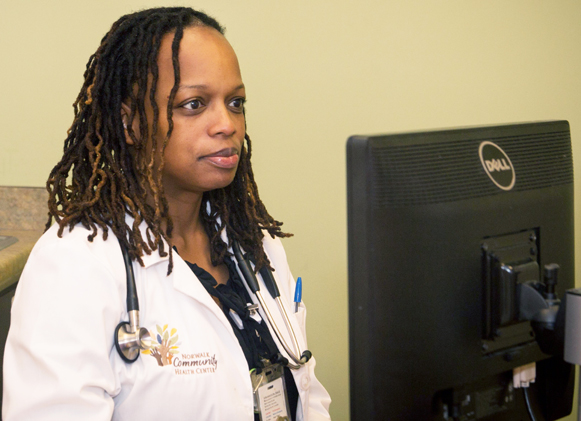The Norwalk Community Health Center is making inroads in a pilot program designed to identify and spend more time with patients who repeatedly use emergency services to improve care, build communications and, ultimately, save everybody time and money.
The program, called WeCare, was launched last May. To date, the facility has registered roughly 180 patients in the program, about 35 of whom are now considered active, the health center”™s Chief Medical Officer Tiffany Sanders said.

“The initiative is designed to identify patients who are high risk or have a lot of needs,” Sanders said. “A fair amount of those patients utilize the emergency department quite often, which can drive up health care costs in an unintended way.”
WeCare is centered on nurse practitioner Rebecca Mizrachi, who focuses on patients with chronic diseases and who have a record of making a high number of visits to the emergency room. Mizrachi”™s goal is to meet with those patients and discuss how to better address their needs and manage their conditions. She often works with a team composed not only of physicians and other medical personnel, but also alcohol and addiction rehab therapists and even law enforcement to come up with goals that are realistic for all.
“We seek to help these high-risk patients to address all of their issues,” health center CEO Craig Glover said. “That can extend in some instances to their housing and food subsidies.”
Some patients may have been unaware that the health center ”” at 120 Connecticut Ave., less than a mile from Norwalk Hospital ”” even exists or can address a medical situation in a nonemergency setting.
Playing an important role in the program is Norwalk Hospital, which was instrumental in helping the center create the program, according to Rowena Bergmans, vice president of clinical integration and population health at Western Connecticut Health Network, of which Norwalk Hospital is a part.
Bergmans noted that under the Affordable Care Act, charitable 501(c)(3) hospitals must conduct a community health assessment and adopt an implementation strategy for addressing prioritized health needs at least every three years or face the loss of nonprofit status. Norwalk met that directive three years ago and ultimately decided that a focus on high-risk individuals was a critical concern.
“Our emergency department data showed that a lot of the people who kept cycling through had mental health or substance abuse problems,” she said, “so we decided to focus on that population first.”
Once identified, such patients usually need to be approached by the care team of either the health center or hospital.
“You cannot expect them to seek out either health care or social services on their own,” Bergmans said. “A lot of times these are people who, whether they have diabetes or alcoholism, are primarily seeking a roof over their heads.”
The teams meet in person once a month to discuss existing patients’ progress and identify possible new WeCare patients.
Sanders said that part of the WeCare approach is “to treat each patient as an individual,” so staff is careful to explain the system to each identified patient, “after which we invite them to join.” Most see the benefit of the program, she said, “but there are some who still say, ”˜No, thank you”™.”
“The program helps patients see the full spectrum of health care services that are available, not just emergency treatment,” Glover said. “We have encountered some patients who were used to using the emergency department for every single thing.”
“Using the emergency room as a safety net is not in the best interests of the patient, Bergmans said. “They are not getting the long-term care they need that way.”
WeCare also flies in the face of payment systems that compensate on a per-visit or per-procedure basis rather than on the quality of care received. (Emergency room visits are usually significantly more expensive than regular office visits.)
“This gets much closer to a value-based payment system,” Glover said. “We”™re taking a more holistic approach to the needs of the patient.”
Sanders said the health center is hopeful that other health care providers will use WeCare as a model for their own approach to managing high-risk patients”™ conditions in a more efficient manner.
“Our model is effective and efficient, helps with costs and provides the best care to the patient,” she said.
NCHC is also looking to add health care practitioners as the program grows, she said.
Bergmans said the hospital has seen about a 30 percent reduction in emergency room utilization. It has also helped secure housing for more than 40 people during the past three years. Its community care team initiative has been expanded to other member hospitals in Danbury and New Milford, she said.



















